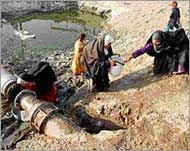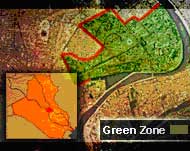Divisions deepen in Iraq
We had just pulled off the main street of Mosul, down an alley, to look for a parking place when my Kurdish guide leaned forward and warned the driver not to stop.

By way of explanation, he pointed to three shadowy figures crouched against the wall of this dark alley.
Wearing black headscarves and armed with Kalashnikov assault rifles, these Arab fighters were certainly not members of the new Iraqi police force – and their presence in this otherwise deserted side street did not bode well.
Husayn, our driver, turned off his headlights and suddenly accelerated past the threatening trio and made a wild right turn at the first intersection.
We were soon lost in a labyrinth of narrow blacked-out streets of what appeared to be some sort of poor market district.
There was no one visible and it did not seem wise to stop and ask for directions, so we continued trying to navigate our way back to the main street.
We heard a volley of gunfire from no more than two blocks away, and we presumed that the Arab fighters had found their target.
Different world
Minutes later, when we had driven back into the brightly lit commercial district, it was like entering a completely different world.
Seemingly unaware of the violence which had transpired only a few hundred metres away, Iraqis were happily patronising restaurants and internet cafes, and honking traffic clogged all the intersections.
 |
|
Iraqis are still short of running |
Such is the surreal daily existence for Iraqi citizens trying to rebuild their economy and infrastructure in the midst of an ongoing guerrilla war.
Although basic utilities such as power and water have yet to be fully restored since the US intervention, the average Iraqi has long since learned to cope with these shortages.
Official unemployment remains around 80% and while a large number of former Iraqi government and military personnel are paid an “allowance” not to work, many others share scarce jobs, working just one day a week.
Trading places
Nevertheless, there is unquestionably an economic boom taking place as foreign aid money and reconstruction contracts are pouring into Iraq.
Consumer goods that were either banned by Saddam – such as satellite dishes and internet services – or forbidden under the 12-year UN embargo – such as microwaves – are now in high demand.
Appliance stores along Baghdad’s main commercial street are dealing so much stock that they cannot warehouse all of their inventory.
As a result, the pavements are piled high with the overflow – protected at night by armed guards.
However, the hottest selling item in Iraq these days is cars, both new and used. At the Turkey-Iraq border crossing alone there are approximately 400 used cars entering Iraq every day.
Many of these vehicles are reportedly stolen in European countries and still emblazoned with the nationality stickers of the original owners.
Car crime
During the 12 years of UN sanctions, Iraq was prohibited from importing cars and spare parts and, consequently, very few vehicles remained in what could be considered roadworthy condition.
Consequently, there is a tremendous demand to purchase replacements, regardless of their origin.
Inside the Iraqi northern border city of Zakhu, in addition to the newly created used car dealerships, one finds a thriving black market in foodstuffs.
In warehouses on the outskirts of town, Kurdish merchants openly sell bags of sugar, wheat, and rice still marked as UN food donations. In recent weeks, the US authorities have tried to reduce the smuggling and profiteering by replacing the local Kurdish guards with customs officials recruited and trained in the city of Arbil.
“Although these new officers are not connected to Masud Barzani, [the local Kurdish political leader], it will make no difference,” says Sabri, a 28-year-old cross-border taxi driver. “Everyone in Kurdistan knows that a border is a business.”
Foreign opportunities
Iraq also represents a tremendous opportunity for foreign corporations seeking to secure reconstruction contracts.
To date, an estimated $5 billion worth of such agreements have been signed by the US administration in Baghdad, which is said to be on the verge of issuing another $18 billion in foreign reconstruction deals.
However, as the security situation worsens and with the Iraqi resistance increasingly attacking soft targets such as civilian contractors, it has become more difficult to attract foreign developers.
Following the attack against four American security guards in Falluja, the US postponed a Baghdad trade fair. The reason for the delay was that after viewing the televised images from Falluja, many of the key participants abruptly cancelled their trips to Iraq.
For the foreign contractors already based in Iraq, the worsening security situation has forced them to seek safer accommodations.
One suburb of Baghdad that used to house the senior members of Saddam’s Baath party is now home to a large number of American civilian executives.
Walled city
In addition to their private security force of ex-Ghurka soldiers, they have erected a solid three-metre-high concrete barricade wall around the entire neighbourhood.
“The Americans have taken over all of Saddam’s palaces and they have occupied the same houses as the Baath party,” said Anmar al-Saadi, a 42-year-old former soldier in Saddam’s presidential guard.
 |
|
Property in the Green Zone is |
“While the Iraqi people hated Saddam and his regime, the Baath party did not have to live in fear behind a concrete barrier. It is like the Berlin Wall.”
Most of the civilian contractors have sought refuge inside what is known as the Green Zone – a 10km sq walled compound that encompasses Saddam’s main palace, a number of former government buildings and the landmark Al-Rashid hotel.
“With everyone trying to get inside here, real estate in Baghdad’s Green Zone is more valuable than property in Manhattan,” said Dave McCracken, a former Canadian combat engineer who is currently managing a de-mining programme in Baghdad.
“About 90% of the people inside will never venture outside during their entire 12-month tours of duty.”
No return
One such soldier is Specialist Scott, a 22-year-old serving in the 4th “Old Ironsides” Division.
Having deployed into Iraq shortly after Saddam’s collapse last spring, Scott and his unit have spent the past 10 months guarding the eastern gate of the Green Zone.
Due to go home in two weeks’ time, Scott told me that he had a seven-month-old son, that he had yet to see, waiting for him at the unit’s home base in Germany.
As we chatted, a VIP delegation of three Mercedes approached the gate. Each car contained an Iraqi bodyguard-driver and three politicians.
As they tried to pass, Scott levelled his weapon at the lead car and instructed the driver to “pull over into lane one”.
|
“I am a member of the Iraqi Governing Council. All of these men are – we are very important people” A man entering the Green Zone |
The second lane over the bridge into the Green Zone is reserved for US military vehicles and means immediate access, whereas lane one had a long line of civilian cars waiting to be searched.
Protesting that he should be given preferential treatment, one of the Iraqi politicians jumped out of the backseat and shouted: “I am a member of the Iraqi Governing Council. All of these men are – we are very important people.”
Scott yelled back, “Not to me you’re not!” and aimed his rifle at the Iraqi’s head. “Now get back in your car.”
When one of the other soldiers joked that Scott might have to explain his actions to his superiors, the young soldier laughed and said, “Whatever happens, I just think to myself, only two more weeks of this. When I get out of Iraq, I’m never coming back … and I mean never.”